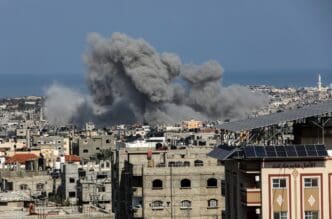An Israeli airstrike struck the northern gate of a field hospital in the Gaza Strip on Tuesday, resulting in the death of a doctor and injuries to nine other individuals. The attack targeted the Kuwait Field Hospital in the Muwasi area, where numerous people have sought refuge in extensive tent camps. Among the injured were both patients and medical staff, with two patients reported to be in critical condition following the incident.
The Israeli military did not immediately comment on the airstrike. Meanwhile, Israeli Prime Minister Benjamin Netanyahu reaffirmed his opposition to the establishment of a Palestinian state during a phone call with French President Emmanuel Macron. This conversation took place after Macron expressed France’s intention to recognize a Palestinian state later in the year.
Throughout the 18-month conflict, Israeli forces have targeted and raided hospitals, alleging that Hamas militants use them for military purposes. Hospital staff have consistently denied these claims, accusing Israel of recklessly endangering civilians and dismantling Gaza’s healthcare system. Recently, Israel targeted the last major hospital providing critical care in northern Gaza, resulting in significant damage to its emergency room, pharmacy, and surrounding buildings. The Episcopal Diocese of Jerusalem, which manages the hospital, condemned the attack as Israel claimed to have targeted a Hamas command center within the facility, despite offering no evidence. Hamas refuted these accusations.
The conflict erupted on October 7, 2023, when Hamas-led militants attacked southern Israel, resulting in approximately 1,200 deaths, mostly civilians, and the abduction of 251 individuals. Although many hostages have since been released through ceasefire agreements or other negotiations, 59 remain in Gaza, with 24 believed to be alive. Israel’s retaliatory offensive has claimed over 51,000 lives according to the Gaza Health Ministry, including over 1,600 deaths since Israel resumed its offensive last month. The ministry, though operating under Hamas control, has its figures generally considered reliable by UN agencies and independent experts, despite Israeli skepticism. The conflict has devastated large areas and displaced nearly 90% of the territory’s approximately 2 million Palestinians, with women and children comprising over half of the casualties.
During his call with Macron, Netanyahu stated that establishing a Palestinian state would serve as “a major reward for terrorism,” resulting in a militant-controlled entity near Israeli cities. In his own statement released on social media, Macron called for another ceasefire, the release of hostages, and the resumption of humanitarian aid delivery to Gaza, which Israel has blocked for over a month. Macron did not mention recognizing a Palestinian state, though he previously indicated France’s aim to pursue recognition by June, coinciding with an international conference on a two-state solution.
International consensus generally views a two-state solution as the only realistic path to resolving the decades-long conflict. Israel captured Gaza, the West Bank, and East Jerusalem during the Six-Day War in 1967, territories the Palestinians claim for a future state. Meaningful peace talks have stalled since Netanyahu’s return to power in 2009, although several European nations have recently recognized a Palestinian state in a largely symbolic effort to revive the peace process.
The Societal Shift
The ongoing conflict and recent airstrikes in Gaza underscore the complexities and challenges of achieving a lasting peace in the region. For the residents of Gaza, the continuous military actions contribute to a deteriorating humanitarian situation, affecting access to healthcare, housing, and basic necessities. The strikes on medical facilities raise international concerns about the protection of civilians and the preservation of humanitarian spaces during conflicts.
The broader geopolitical implications are significant, as the dialogue between international leaders like Netanyahu and Macron highlights the divergent perspectives on the path to peace. The potential recognition of a Palestinian state by countries like France could impact diplomatic relations and influence future peace negotiations. As the international community grapples with these developments, the need for sustainable solutions that address the root causes of the conflict remains paramount. In the meantime, the humanitarian toll on ordinary citizens continues to grow, prompting calls for renewed efforts toward reconciliation and dialogue.








